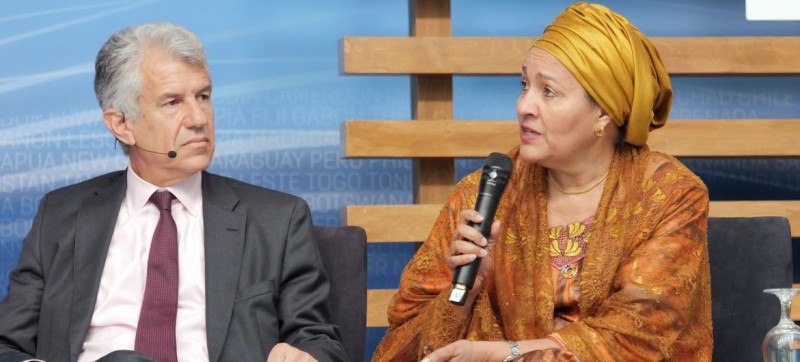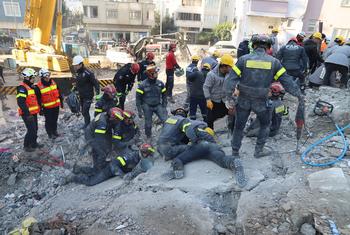
United Nations The UN Deputy Secretary-General Amina Mohammed (right) addresses an event at the Spring Meetings of the World Bank Group and International Monetary Fund.
Delivering remarks at a forum on reform held during the Spring Meetings of the International Monetary Fund (IMF) and the World Bank, she called for course correction now – the halfway point to achieve the goals by 2030.
Tweet URL
In recent years, developing countries have been battered by soaring energy and food costs, the climate emergency, and the COVID-19 pandemic. These crises have unfolded amidst rapidly tightening global financial conditions and rising borrowing costs.
‘Flawed’ financial system
The situation has put vulnerable countries at greater risk of debt distress and undermined their ability to invest in recovery, let alone climate action and long-term sustainable development.
“These widespread challenges are indicative of a flawed global financial architecture – one that was designed for a world that no longer exists, and is too short-sighted, crisis-prone, and deeply unequal,” she said.
Ms. Mohammed recalled that the UN Secretary-General has supported calls for reform and has even proposed a global SDG Stimulus Plan of at least $500 billion annually to scale-up affordable long-term financing for countries in need.
Actions would include mobilizing official financing at scale, lowering the cost of borrowing, and providing contingency financing in times of crisis, she said, adding that they can be taken immediately and without any changes to the current financial architecture.
Find common ground
“There is no reason not to act and yet, the international community is not finding common ground; the G20 in particular remains at an impasse,” she said, referring to the world’s leading economies.
“But, failing to listen to these clear cries for change would be a mistake, one that would lead to the decoupling of our global financial system and an unravelling of multilateralism at large,” she warned.
Ms. Mohammed pointed to upcoming opportunities “to build a coalition of like-minded leaders to drive an ambitious financing package for the SDGs and climate action”.
They include the Bridgetown Initiative, put forward by the Prime Minister of Barbados, Mia Mottley; a “Global Financing Pact” summit in June convened by French President Emmanuel Macron, and the SDG Summit and High-Level Dialogue on Financing at UN Headquarters in September.
Five key areas
“Actions taken now, as proposed in the SDG Stimulus, would go a long way towards addressing the urgent challenges of the moment, but they need to go hand in hand with an effort to reform and address deep and longstanding flaws in the international financial architecture,” said Ms. Mohammed.
The UN deputy chief stressed that reforms should address challenges in five inter-related areas, starting with reforming global economic governance.
“With developing countries playing an ever-more important role in the global economy, there is a need to broaden and strengthen their representation in the governance of international institutions,” she said.
Financing global good
Ms. Mohammed called for closing gaps in the sovereign debt architecture. She said the current international system does not have the tools required to drive deep and rapid debt restructuring, nor is it equipped to address a systemic debt crisis.
Her third point concerned reshaping international public finance, including through the massive scale-up of affordable and long-term financing for investments in sustainable development. For example, she said the lending terms of multilateral development banks can be improved, such as longer-term loans and lower interest rates.
She added that the international public finance system also was not set up to finance public goods, such as climate action, or to prepare for the massive transition to “green” and digital economies, underscoring the need for a solution.
Recent crises have also revealed that global financial safety needs to be strengthened, she continued, while the rules of the banking and financial systems must be reset, as evidenced by recent bank failures in the United States and Switzerland.
Ms. Mohammed said most of these reforms are already being discussed by the international community, but it is now time “to bring these disparate discussions together, and build the political will required to transform these ambitions into reality”.

Türkiye-Syria Earthquake
DONATE!
Emergency and search-and-rescue teams have deployed to assess and prioritize urgent needs and to provide life-saving assistance following the devastating earthquake near the Türkiye-Syria border.

